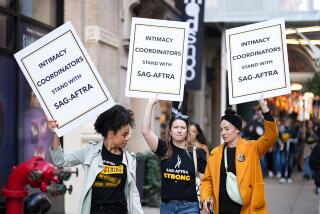Citing AIDS Fear, SAG Takes Stand on Film Kissing
The Screen Actors Guild, citing what it called “the lack of clear and consistent medical opinion” on how AIDS is transmitted, said Wednesday that actors must be told before they are hired whether they will be required to perform “open-mouth” kissing scenes.
If such notice is not given, the guild declared, an actor can refuse to perform such a scene and still finish the production at full pay.
The guild’s policy statement, made in a letter sent this week to 6,000 producers and actors’ agents, marked the first public stand by a major actors’ union on the kissing issue, which has been a persistent cause of concern by performers since the disclosure that the late actor Rock Hudson had acquired immune deficiency syndrome. No actor has publicly voiced alarm.
Three weeks ago, with no fanfare, the other major performers’ union, the American Federation of Television and Radio Artists, issued a similar policy statement to its members. Although it did not specify AIDS and open-mouth kissing, the union said its members “should and do have the right to refuse contact with anyone whom they believe may have any communicable disease.”
SAG’s letter comes at a time when Hollywood has been supporting fund-raising efforts to fight AIDS, an incurable disease that has claimed more than 7,000 lives in the United States.
The letter was promptly disputed by the Alliance of Motion Picture and Television Producers, which contended that the guild has no medical or legal basis for letting its members balk at kissing scenes.
In this country, AIDS primarily afflicts homosexuals, intravenous drug abusers and hemophiliacs, and medical experts say there is no evidence that it can be transmitted by casual contact with or proximity to an AIDS victim.
Scientists from the National Institutes of Health and the Centers for Disease Control say it is not possible to state categorically that AIDS never will be contracted through open-mouth kissing. They note, however, that there has not been a single documented case in which AIDS has been transmitted through kissing or any other casual contact.
Although the antibody to the AIDS virus has been isolated from saliva, researchers identify as risky only so-called deep kissing, in which large amounts of saliva may be passed on to the other person. AIDS researchers say that if the AIDS virus were transmitted by all types of kissing, the volume of AIDS cases would vastly exceed the number reported so far.
The alliance, representing major studios and several hundred film and television producers, said that it is “sympathetic to the concerns of performers” about open-mouth kissing scenes but that it knows of no medical evidence that shows AIDS can be transmitted by such kissing.
Thus, it said, it disagrees with SAG’s statement that “there may be a possible hazard to the health of actors in light of the lack of clear and consistent medical opinion as to how or in what manner this disease is communicated from one person to another.”
The alliance also said it does not think SAG can make open-mouth kissing a category of hazard under a section of the guild’s contract that requires notice to actors facing dangerous work. The guild’s letter also cites a provision that says actors “shall not be placed in circumstances hazardous or dangerous to the individual.”
“What we are saying is that based on the medical evidence we’ve seen, open-mouth kissing does not constitute hazardous work that requires advance notice under the hazardous work provision” of SAG’s contract with the alliance, said alliance executive Carol Akiyama.
She said her organization will later say this formally to executives of the 50,000-member guild. About 30,000 SAG members live in Los Angeles and 25,000 live in New York, according to the guild, which represents film performers.
SAG’s policy letter from the guild’s national board says that if performers are not notified of an open-mouth kissing scene in advance, they have the right to refuse performing in it “without any penalty” and are “entitled to finish the production with full pay. . . .”
The letter also said that to avoid possible violation of SAG’s policy barring discrimination against actors because of their sexual preference and to avoid “embarrassment to any performer, such notice should not disclose to either performer the identity of the other in a scene which will require open-mouth kissing.”
Rumors of Discrimination
Last month, SAG asked the alliance to meet with guild officers and discuss rumors of discrimination against homosexuals because of AIDS fears. The union said at the time that it had heard no evidence that homosexual actors were being discriminated against on such grounds.
Akiyama said her group had since held several meetings with SAG officials. She said the alliance told SAG it fully intends to abide by a non-discrimination agreement reached by both sides several years ago.
The producers also promised, she said, to support an educational campaign about AIDS and to begin an extensive study “regarding the medical aspects of AIDS and any potential impact (of the disease) upon working conditions” in the film and TV industries.
Two major candidates for the presidency of SAG disagreed Wednesday on the usefulness of the guild’s policy letter on open-mouth kissing. Ed Asner, the current president, is not seeking reelection.
‘The Most Expedient Way’
The letter “seems to be the most expedient way to avoid problems with the membership,” candidate Patty Duke told a news conference in Hollywood. She called it an “appropriate cautionary measure to deal with the concerns and fears of certain performers.”
Ed Nelson, her rival, said in an interview the letter “doesn’t solve anything. It’s kind of an absurd notice. . . . I just think it’s unwise not to have a joint (guild-alliance) committee study the matter. After all, we’re in this industry together.”
AFTRA’s policy emphasizes that the union’s current contract cannot use the AIDS crisis to justify discrimination against gay performers.
The union, which says it has 67,000 members and whose jurisdiction covers actors in live and taped broadcast productions, had planned only to inform members of its policy on AIDS in AFTRA publications.
“We’re not making a big thing about it,” said Dick Moore, an AFTRA spokesman.
Times medical writer Harry Nelson and staff writer John Voland also contributed to this report.
More to Read
The biggest entertainment stories
Get our big stories about Hollywood, film, television, music, arts, culture and more right in your inbox as soon as they publish.
You may occasionally receive promotional content from the Los Angeles Times.









